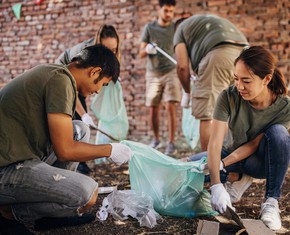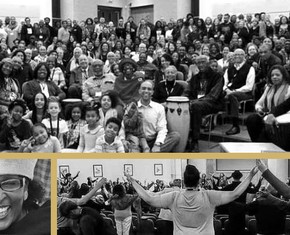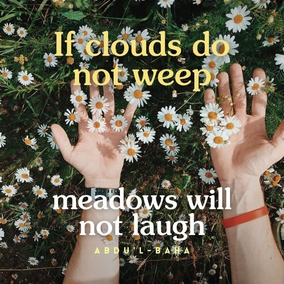The views expressed in our content reflect individual perspectives and do not represent the authoritative views of the Baha'i Faith.
Baha’is refer to Abdu’l-Baha as “the perfect exemplar” of how to live as a Baha’i—in large part because of his actions affirming the nobility of every human being. Baha’u’llah, the prophet and founder of the Baha’i Faith, wrote:
O Son of Spirit! Noble have I created thee, yet thou hast abased thyself. Rise then unto that for which thou wast created.
Abdu’l-Baha traveled to North America in 1912 and spent 239 days in the United States and Canada. While there, he took every possible opportunity to bring up the subject of race and racial prejudice in his conversations, praised those who worked for racial amity, and publicly broke the segregated “Jim Crow” social conventions of the time. He asked concerned believers in Baha’u’llah to commit themselves to refining and expanding their own and others’ awareness of the fundamental verities of the Baha’i Faith on racial equality. He asked everyone he met, primarily in the white population, to recognize and eliminate their prejudices, often quoting Baha’u’llah when he said:
The well-being of mankind, its peace and security, are unattainable unless and until its unity is firmly established.
The Baha’i writings describe racism and the elimination of racial prejudice as America’s most vital and challenging issue. In Citadel of Faith, Shoghi Effendi wrote in the 1950s:
No less serious is the stress and strain imposed on the fabric of American society through the fundamental and persistent neglect, by the governed and governors alike, of the supreme, the inescapable and urgent duty—so repeatedly and graphically represented and stressed by Abdu’l-Baha in His arraignment of the basic weaknesses in the social fabric of the nation—of remedying, while there is yet time, through a revolutionary change in the concept and attitude of the average white American toward his Negro fellow citizen, a situation which, if allowed to drift, will, in the words of Abdu’l-Baha, cause the streets of American cities to run with blood …
Abdu’l-Baha’s prediction has come true. One only need to look at recent examples of racialized violence in Charlottesville, Virginia or the shooting deaths of unarmed black men by police officers to validate the prophetic nature of His words. The work necessary to heal racism in America has not fully happened, and our nation feels the effects of generations of negligence. As the Reverend Dr. Martin Luther King wrote in his final essay:
The nation waited until the black man was explosive with fury before stirring itself even to partial concern. Confronted now with the interrelated problems of war, inflation, urban decay, white backlash, and a climate of violence, it is now forced to address itself to race relations and poverty, and it is tragically unprepared. What might once have been a series of separate problems now merge into a social crisis of almost stupefying complexity.
RELATED: That Time Martin Luther King, Jr. Shocked the World
Of course, America has no exclusive claim on racial prejudice. It exists everywhere, and no matter where we live on the planet, all of us have the same spiritual responsibility, according to the Baha’i teachings—to eradicate bias, racism and prejudice from our hearts, minds and souls. Abdu’l-Baha said:
Thou must instruct the people of the world in the Love of God, that they may eradicate the foundation of warfare and strife, … construct the edifice of reconciliation, dispel the darkness of estrangement, diffuse the light of unity; change the poison of animosity into the honey of sympathetic affection; destroy the religious, national and social prejudices from the individuals of humanity; live and act, with and toward each other as though they were from one race, one country, one religion, and one kind.
For some people—especially those unaccustomed to talking about racial issues—this conversation doesn’t always have an easy starting point. Even if you have the inclination and the resources to educate yourself, listening to talks or reading articles can only begin to shift mindsets or broaden individual horizons. Instead, we need to engage others in the discourse—especially people of color, who have suffered the most from racism—and learn from their experiences.
RELATED: How Interracial Friendships Can Lead To Racial Healing
So it may help to have a few initial questions in mind to start those conversations. But remember, that’s only a start—just asking a few questions won’t solve the problem. Having the right attitude, the right relationships, and the right motivation for entering the conversations are much more important than canned questions. If no relationship exists, everything can go wrong even with a perfect question. With the right relationship, with people you truly care about, questions come up naturally, and we can bounce back from any question even if it is not perfect.
To help those who haven’t dealt with these issues extensively begin the work of eradicating prejudice and racism, this list of discourse-starter questions may help spark some internal soul-searching, or lead to meaningful discussions with your friends and family. Individuals have the power to take these matters into their own hands. You don’t need a huge platform to make a difference—you can bring the discourse on race offline and into your homes, in your cars on family road trips, while sharing a meal with your friends, and during breaks at work with your peers.
RELATED: What Can White People Actually Do About Racism?
Instead of turning to social media to complain about your racist uncle, use these questions as tools to get a deeper level of understanding about why your uncle thinks the way he does. These questions aren’t meant to have quick, easy answers—they simply mean to start much-needed discussions:
- How can I become more aware of my own unconscious prejudices?
- When has my own heart changed for the better? How can I re-create that change in my community, so people’s hearts change when it comes to having constructive conversations about race?
- How can I find other people or groups in my community who already engage in race unity discussions?
- Which prejudices do I see permeating my community? How can I help shift the conversation?
- How can I genuinely engage with people who look different than me without reducing them to a “token” (i.e. token Black friend)?
- What three ways can I discover to become friends with people outside of my current circle?
- When was the last time I made a new friend who didn’t look like me? How did we meet?
- If my child asked for consent to marry someone from a different race, what would my response be? Why?
- What behaviors or attitudes do I hold that do not create inclusivity?
- How do I ensure that my actions are aligned with unity, and don’t just end with words?
- We know a lot of racism starts in the home. How can parents prevent it?
- What role do parents have in making the next generation more inclusive than their own?
- Where will racial issues go in the next 25 years?
- How can stereotyping lead to racism?
- How have race relations changed during the last five decades?
- How can mixed or multicultural people play a role in discussions of racism?
- Some people see racism as a solely Black vs. white issue. What role can I play in bringing about racial unity, even if I don’t identify as Black or white?
- How often do I think about race? In what context?
- Who do I talk to about race? Who do I avoid talking to about race?
While each question might not apply to everyone, perhaps this list can provide a starting point for deeper conversations. On an individual and a collective level, just in the way we talk to ourselves and others, we all have the power to start contributing to change.
















Comments
Sign in or create an account
Continue with Googleor